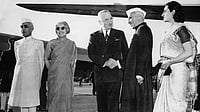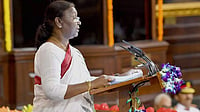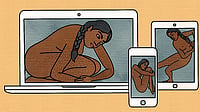Last year the poetry editor of a small New York-based magazine asked if I was interested in writing a poem on friendship, to which I joyously responded yesyesyes. It was summer and I had just returned from a late evening walk by the river, my heart still full from the glow of the fireflies that lit up the woods along its edge. For some of us, poetry is a dark, dark secret, its stain spilling but held inside random pages in old notebooks, too much of a guilty pleasure to be shared with strangers. There are better poets, I thought, who publish on love and war and rising prices and everything in between. But this time it was about friendship. This time the stakes were high.
A class discussion I have with my students early in the university semester is on friendship, via a scholarly article written by Elizabeth Spelman and Maria Lugones titled ‘Have We Got a Theory for You.’ The article is about the impossibility of speaking in a unified voice even as women when we have such diverse histories and different experiences, but it is most eloquently about friendship. Friends do not try to extract information to control or exploit, we are reminded by the authors, nor do friendships grow in the soil of guilt. So instead of trying to craft more nuanced theories on allyship, just do what you’d do for a friend, is the authors’ deceptively simple (epistemo) logical solution to communicating across differences. Yet - what do we do for a friend? We are intrigued by stories of friendship between literary and intellectual greats: Gandhi and Rabindranath Tagore, Tagore and Yeats, Virginia Woolf and Lytton Strachey, Langston Hughes and Zora Neale Hurston…the list is long. Even Sanskrit epics like the Mahabharata speak of beautiful friendships, such as between Draupadi and her sakha Krishna. Yet our cultures still place an inordinate emphasis on romantic love, with a zillion books, podcasts, and relationship coaching on how to be a better partner. Where do we learn how to be a friend?
Recently a student made an insightful comment in class; she pointed out how in the romance genre, the character of the “best friend” provides a safe, uncomplicated backdrop to the frisky couple whose amorous adventures take centre stage. It made me think how this safety is also a bulwark against more “threatening” emotions such as romantic attraction – the friendship between two heterosexual individuals, for instance, or a straight woman and a gay man. Indeed many poets, let down by the unreliability of exciting lovers, have penned how they were redeemed by dependable friendships. Emily Bronte’s famous poem ‘Love and Friendship’ conveys this sentiment well: “Love is like the wild rose-briar / Friendship like the holly-tree / The holly is dark when the rose-briar blooms / But which will bloom most constantly?”
Perhaps the best life partners are not just good lovers but better friends, to go soul-wards rather than only skin-deep. Some lines on the love that still haunt me since I first came upon them years ago are by Yeats: “How many loved your moments of glad grace / and loved your beauty, with love false or true / but one man loved the pilgrim soul in you / and loved the sorrows of your changing face.” But what when the dividing line is blurrier in a different way? Friends turned lovers, lovers turned friends, friends, who’d rather be lovers, lovers who’d rather be friends? In ‘Amorous Friendship', Belle Randall writes of “a returned but unrequited love affair, yearning for spring with winter in the air / Call it friendship and forget the amore…hurt in the heart / perceiving something as ended, where friends have no fear in being apart.” Ella Wheeler Wilcox says it with a deeper sigh in ‘Friendship After Love.’ “So after Love has led us till he tires /of his own throes, and torments, and desires / Comes large-eyed friendship, with a restful gaze…We do not wish the pain back, or the heat / And yet, and yet, these days are incomplete.”
Letting go is easier, sometimes. For Mary Oliver, “to live in this world, you must be able to do three things: to love what is mortal/ to hold it against your bones knowing your own life depends on it /and, when the time comes to let it go, to let it go.” Travelers, especially – not seasonal tourists but seasoned travelers – must master the art of letting go. Elizabeth Bishop’s long-loved poem ‘One Art’ could just as well be a traveler’s anthem. ‘The art of losing isn’t hard to master / so many things seem filled with the intent to be lost / that their loss is no disaster / I lost two cities, lovely ones / And, vaster, some realms I owned, two rivers, a continent / I miss them, but it wasn’t a disaster.’ From New Delhi to New York and many more stops between, I too have learned to live with the (non)disaster of loss, of people and places who no longer are. Yet if my heart calls someone a friend, I do try to hold on. While attachment to the undeserving is not without its own perils, I have mostly been fortunate when it comes to some serendipitous friendships.
It was on account of this good fortune, for which one is grateful to the universe, and for so much else that can be said about it, that I promised the editor I would write a long poem on friendship. Yesyesyes. He said it could rhyme (I cannot be sure if it was encouragement or resignation), without bringing up such ponderous subjects as the iambic pentameter. It wasn’t an urgent political event that needed immediate media commentary, so I held on to my resolve and waited. The time seemed right after a few months. I scribbled six lines and sent it to the editor to gauge his initial reaction, only to be crisply informed that Friendship Day had long passed and would I please resend it next July for the magazine’s special edition that year.
So the poem is still incomplete, though I did add some lines later. It is only February; there may be time yet to complete it by July. Meanwhile, if you miss talking to a friend on a non-friendship day during non-July – write again, for no reason at all – here is my unfinished poem.
Sadly, I am not a poet. I write prose
Which has its own pitfalls, I suppose
But one thing prose does not do
Is demand a silly rhyme from you.
Yet I would do it for a friend
To hold on to what must not end
So this non-poem on friendship I share
(The literary establishment does not care.)
Whatever the quality of my art,
I hope it finds its way to a friendly heart.





















